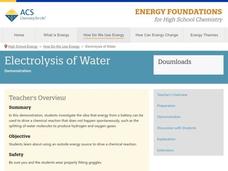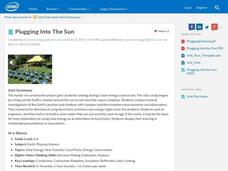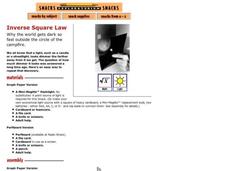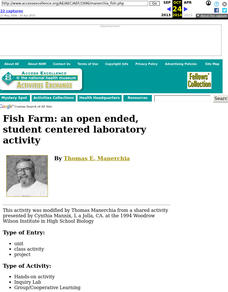International Technology Education Association
Telescope as Time Machine
This resource provides an explanation of NASA's GALEX mission and how the space-based telescope can view distant galaxies as they were billions of years ago. The resource also discusses the other aspects of galaxies that GALEX is able to...
Desert Discoveries
Lizard Dash!
Here is a terrific learning game that has pupils acting like lizards! Before the game starts, there is a class discussion on the differences between endotherms and exotherms. The main focus of the game is how each team must keep their...
Curated OER
Drama from Animal Characters
Learn about animal habitats, characteristics, and writing in a different perspective. The class composes a narrative from the perspective of a fresh water animal, they include a problem and the animal's reaction to the problem. The...
National Library of Medicine
Your Environment, Your Health: Food Safety
Did youknow that chicken causes the greatest risk of food-borne illness. The fourth unit in a six-part series addresses food safety. Scholars research common scenarios of food causing illness through the National Institute for Health....
Science 4 Inquiry
Edible Plate Tectonics
Many people think they can't observe plate tectonics, but thanks to GPS, we know that Australia moves at a rate of 2.7 inches per year, North America at 1 inches per year, and the Pacific plate at more than 3 inches per year! Scholars...
Science 4 Inquiry
Phases of the Moon
The moon takes just over 27 days to orbit around Earth. Young scientists position themselves as the earth as they rotate around the sun and hold the moon. This allows them to observe the patterns and phases of the moon.
Curated OER
The Reasons for the Seasons
Young scientists use a globe and a light to simulate the rotation of the earth and sun to show the seasons. Additionally, they simulate direct sunlight and indirect sunlight showing intensity of the sun, and answer questions based on...
Discovery Education
Sonar & Echolocation
A well-designed, comprehensive, and attractive slide show supports direct instruction on how sonar and echolocation work. Contained within the slides are links to interactive websites and instructions for using apps on a mobile device to...
American Chemical Society
Electrolysis of Water
Young scientists know that water is H2O, but can they prove it? Through a simple electrolysis of water demonstration, scholars see the two gases produced as a result of a chemical reaction. Because this reaction doesn't happen...
National Wildlife Federation
Quantifying Land Changes Over Time Using Landsat
"Humans have become a geologic agent comparable to erosion and [volcanic] eruptions ..." Paul J. Crutzen, a Nobel Prize-winning atmospheric chemist. Using Landsat imagery, scholars create a grid showing land use type, such as urban,...
Intel
Plugging into the Sun
What's cooking? A sizzling STEM unit challenges scholars to build a solar cooker that can successfully cook an egg. The unit opens with a study of Earth's rotation, the sun's energy, and shadows. Pupils use a compass and thermometer to...
California Academy of Science
Kinesthetic Astronomy: Moon Phases
We are the world! Each of your class members models Earth and holds a styrofoam ball to see its phases. Thorough teacher background information and a detailed lesson plan will make this a cinch to teach. If you do not want to purchase...
Exploratorium
Inverse Square Law
The inverse square law is revealed when your class participates in this activity. They move a graph paper or perfboard square back and forth in a square of light to see how the intensity changes. You will definitely want to add this...
Cornell University
Shedding a "Little" Light on Cancer Surgery
Many types of cancer treatments now depend on nanotechnology—a big "little" discovery. Scholars begin by removing "malignant" tissue from simulated brains, one using fluorescent markers thanks to nanotechnology and one without. This...
Science 4 Inquiry
Rocks Makin' Rocks: Rock Cycle Simulation
Scholars review prior knowledge before completing a hands-on simulation of the rock cycle. They write stories or songs summarizing their simulations to demonstrate mastery.
NASA
NASA
Everything you have ever wanted to know about our solar system, space exploration, and more can be found here. Be prepared to clear your schedule; you will be sucked into the app like a star into a black hole.
Curated OER
Fish Farm: an open ended, student centered laboratory activity
Students are contacted by a fictitious company which raises tropical fish to do basic research for them so that they might keep their production costs down. They need to know the optimum salinity in which to hatch the brine shrimp that...
Curated OER
Using Bubbles to Learn about Light Interference
Students explain the wave properties of light.
Curated OER
Using Bubbles to Learn about Light Interference
Students explore constructive interference and destructive interference. In this light travel instructional activity, students follow procedures to discover how light waves travel and experience interference.
Curated OER
Balancing The Day Away In Grade 2
Second graders sped the day exploring about balance by playing with and making balancing toys. They discover how varying the amount and position of mass affects the toys' balance. Pupils explore gravity and balance while playing with the...
Texas Center for Learning Disabilities
Second-Grade Explicit Intervention
Unfortunately, not all students learn to read at the same pace, but with the help of this resource, you can ensure that they all receive the support they need to reach this important goal. Comprised of short literacy activities, these...
Texas Center for Learning Disabilities
Fourth-Grade Text-Based Intervention
Provide young readers with the extra support they need using this series of 10 literacy lessons. Following a repeated sequence of learning activities, these lessons engage children in expanding their vocabulary and developing their...
Virginia Department of Education
World History and Geography: 1500 A.D. (C.E.) to the Present
Intended to help Virginia teachers align their curriculum to the state's history and social science standards, this packet provides a wealth of materials for any social studies or science instructor. Loaded with plans, suggestions for...
Education Development Center
Micro-Geography of the Number Line
Young mathematicians dive into the number line to discover decimals and how the numbers infinitely get smaller in between. They click the zoom button a few times and learn that the number line doesn't just stop at integers. Includes a...

























